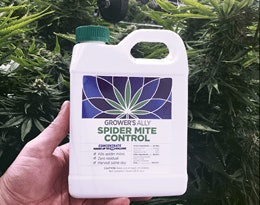
1. What tools should cultivators invest in to protect their operation?
Two of the most common problems cannabis growers face are plants ruined by pests and contaminated end-product. The best tool you can deploy is a strong IPM program that gives your plants the best opportunity to thrive. The need for preventive care is greater than ever because today’s hybrid strains are more susceptible to problems due to crossbreeding.
2. What is one thing that anyone starting out should budget for early on?
Budget for preventive care. It is always less expensive to be proactive then it is to be reactive. Maintaining healthy plants from the early stages of growth makes an incredible difference to the quality of your end-product. While many cultivators focus on treatment during the flowering stage, preventive treatments are especially important during the vegetative stage when plants are growing rapidly. You may not see problems such as russet mites and spider mites, but lots can be happening on new growth, and by the time you get to flower, it is a visible problem.
3. How do you effectively treat a problem while maintaining a compliant output?
Simply put, use products that test clean. Mites and mildews are completely manageable with the right inputs. When sourcing a pesticide product, steer clear of synthetics, heavy oils and formulas with alcohols. You must protect your profits and your business by selecting pesticides that are registered by state agencies for use in cannabis production. Look for the OMRI Listed® and FIFRA 25(b) Exempt designations. It is important to your end-product and, more importantly, to the end-user.

4. What advice do you have for pesticide application?
Use formulas that are safe for your crew, and consider the tools you will use for delivery. Zero REI (re-entry interval) formulas with no PPE (personal protective equipment) for applicators will be most efficient. Invest in an atomizer. They create excellent coverage with a micronized mist. It is very effective at delivering the formula to smaller bugs and eggs. With a super-fine spray, your product will end up on the plant, not on the floor, and go a lot further. Simply put, more bang for your important dollar.
5. How are biopesticides different from other pesticide formulas?
Biopesticides are a form of pesticides that are derived from naturally occurring biological materials, like essential or botanical oils. For example, formulated with rosemary, clove and peppermint oils, Grower’s Ally Spider Mite Control is a highly effective biopesticide for preventing and killing soft-bodied insects. While many heavy oils kill by suffocation, the primary mode of action in the Spider Mite Control formula is paralysis. Insects that can’t move, can’t eat and can’t reproduce cannot cause any more damage. The rosemary in Grower’s Ally is cultivated in the U.S. from a single source, which translates to purity and consistency in the formulas, even when your environmental conditions may be variable. Because it is a light essential oil, the biopesticide formula volatilizes in 48 hours, leaving behind no residue.
Learn more: growersally.com















